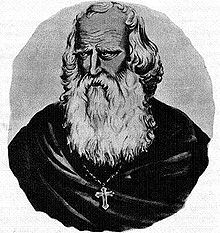Nerses I
- There was also a Caucasian Albanian Catholicos Nerses I, who ruled in 689–706, and a Patriarch Nerses I of Constantinople, who ruled in 1704.
Saint Nerses | |
|---|---|
 | |
| Born | Fourth century |
| Died | 373 |
| Venerated in | Catholicos of Armenia |
| Feast | 19 November[1] |
Nerses I the Great (Template:Lang-hy) was an Armenian Catholicos (or Patriarch) who lived in the fourth century. He was the son of At'anagenes and his mother was the Arsacid Princess Bambish, a sister of King Tigranes VII (Tiran)[2] and a daughter of King Khosrov III. His paternal grandfather was St. Husik I whose paternal grandfather was Saint Gregory the Illuminator.
Nerses spent his youth in Caesarea where he married a Mamikonian Princess called Sanducht. Sanducht bore Nerses a son called Sahak, who would become another Catholicos in Armenia. After the death of his wife, he was appointed sword-bearer to King Arsaces II (Arshak II). A few years later, having entered the ecclesiastical state, he was elected Catholicos in 353.
His patriarchate marks a new era in Armenian history. Till then the Church had been more or less identified with the royal family and the nobles; Nerses brought it into closer connection with the people. At the Council of Ashtishat he promulgated numerous laws on marriage, fast days, and divine worship. He built schools and hospitals, and sent monks throughout the land to preach the Gospel.
Nerses held a synod at Ashtishat that, among other things, forbade people to marry their first cousin and forbade mutilation and other extreme actions in mourning.[3] Some of these reforms drew upon him the king's displeasure, and he was exiled, supposedly to Edessa. It was probably at some point during the latter part of Arshak's reign that Nerses went to Constantinople to ensure the emperor's support of Armenia against the Persians. According to P'awstos Buzandac'i's account Roman emperor Valens became outraged at Nerses condemning his following of the teachings of Arius and sent Nerses into exile.[4] While Nerses was in exile in Xad he was the leader of the church in Armenia.
Upon the accession of pro-Arian King Papas (Pap) (369) he returned to his see. Papas proved a dissolute and unworthy ruler and Nerses forbade him entrance to the church. Under the pretence of seeking reconciliation, Papas invited Nerses to his table and reportedly poisoned him in 373.
In the Arts
- Nerses is a character in the tragedy Nerses The Great, Patron of Armenia written in 1857, by the Anatolian Armenian Playwright, Actor & Editor of the 19th century, Sargis Vanadetsi also known as Sargis Mirzayan.
See also
Sources
![]() This article incorporates text from a publication now in the public domain: Herbermann, Charles, ed. (1913). Catholic Encyclopedia. New York: Robert Appleton Company.
This article incorporates text from a publication now in the public domain: Herbermann, Charles, ed. (1913). Catholic Encyclopedia. New York: Robert Appleton Company. {{cite encyclopedia}}: Missing or empty |title= (help)
